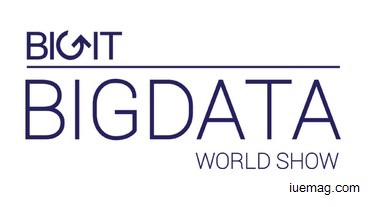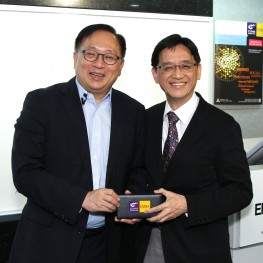Being the Chairperson of the largest and most prestigious Enterprise Technology Show in Malaysia IT conference on the concurrent segment of the 3rd Big Data World Show, he needs no introduction in this unchartered field. He may go about this role of introducing each speaker of their credentials and the title of the each track to be presented because perhaps he knows them personally and if he doesn’t, he hopes to be able to know them more than just the portfolio the organiser have provided him. A hint that perhaps he wish to be like Chief John Anderton (cast by Tom Cruise in Minority Report, 2002) where “in a future where a special police unit is able to arrest criminal before they commit their crimes from Pre-Cogs Déjà vu visions” because he mentioned this movie numerous times in his role in relation to the possible future that Big Data can offer. So, is Big Data a hype if you have not heard about it or even the concurrent conference introduced for the first time here with Big Data, Internet of Things ( IoT), let’s find out as iUeMag covers this conference with a series of related stories that might inspire you to ‘see the future’.

Dr Toa Charm, is no stranger to the Big Data community who is based in Hong Kong. Brief highlight of his bio data provided by the organisers “He has more than 25 years of management experience from leading multinational and Chinese companies in Asia Pacific. Dr. Charm was Associate Partner of IBM GBS Greater China, Regional Head of BI Competence Centre for HSBC Asia Pacific, General Manager of Oracle (BI Division), Managing Director of Hyperion Greater China and General Manager of Kingdee Asia Pacific. He specialises in business intelligence (BI) and big data, financial technology (FinTech), digital and internet+ transformation, strategy, business models innovation, customer experience and loyalty, and internationalization for emerging enterprises.” However, if I can at a click of the button also introduce Dr. Toa just like my buddy whom I visits frequently in Hong Kong, where we frequent our favorite restaurants or cafe, that would be mind blowing. However, Big Data is not about ‘hacking’ or stalking another person from the commercial transactions data generated by various systems, but it does tell a story that may not be documented or identified unless the dots are connected.One of the speakers had mentioned that, there is too much data due to data explosion so we need policies to enforce the data owners to filter, archive or ultimately delete them if considered ‘no value’. I asked the questions how one can decide what to delete for now because it may just be of some intrinsic value in the future. Data Deduplication and Compression technology tools for data storage have definitely reduce the volume but it is just a tool, that speaker says. Dr Toa later presented a chart about CEOs and their data titled “What CEOs Think about Data?” seems to imply without data, there is no Big Data but just how do we monetize this.
Dr Toa Charm, in his own presentation track titled “Big Data Innovation and Monetisation: Optimising the Return from Your Big Data Investment” he mentioned about Global Open Data Index (ODI) and recent initiatives by President Obama especially for Facebook to share ‘some’ data, not just because the ODI benchmark now has UK as the leader, followed by US who lead previously, and then by Denmark, Norway, Netherlands, Australia on the list goes on, will allow for Big Data to be widely employed for productivity if the data can be monetized. He also reiterates that Business Intelligence is not Big Data because it reflects the past. So if data can somehow predicts or reflects on the possible future of clustered human behavior or environmental circumstances, corporations will be more productive as more data is available to connect the dots via Social Capital based on Tribe and Opinion Leaders for specific topics, these data are now assets for Big Data implementation. If your corporations have been employing Business Intelligence concepts for decision making, he believes the shift is now towards Big Data. However, some alignment are required between company directions and their Big Data strategies where an EcoSystem is required to be implemented to acquire the data before more apps usage and consumption of Big Data because we just cannot answer ALL the questions but more can be. Interested concepts you think but bear in mind this requires much work and effort which means more workers and these are knowledge workers, experts in their field.
As an young IT professional you may ask,
“How does this differ from conventional computing discipline that highly concerns with garbage in garbage out, GIGO, predicaments and final decisions based on absolute accurate data”. Well, whether this is considered as creative computing, Big Data differs slightly where decision can be made around the “sweet spot” of the results presented, it may not be a definite certainty but a higher offset in hitting the target mark is presented. Management instinct can be further refine when such options are employed. Is this then just a new idea or simply just how we begin to EVOLVE in our decision making? I let you decide, for example to get to your favorite cafe for your tea break, the waze app says 10 minutes but offers multiple routes of 14 and 15 minutes. You will get there eventually is what I can conclude and I hope Dr. Toa will not be mad with me if I was just 3-4 minutes late meeting up with him for coffee in Hong Kong to update his latest bio data so that I can introduce him at the “
Pre-Cogs Déjà vu 2050: Final Judgment or Just Dreams” Conference…. sometime in the future, perhaps?
Big Data, a hype or just an evolution of data processing? You decide!
Dr Toa Charm recommends this a good read –
Big Data: A Revolution That Will Transform How We Live, Work, and Think – by Viktor Mayer-Schönberger (Author), Kenneth Cukier (Author).






